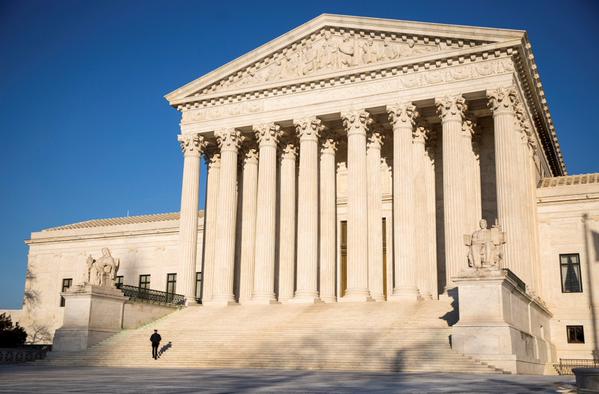Attorneys for the city of Baltimore have asked the Supreme Court to review a unanimous decision handed down in January by the 4th U.S. Circuit Court of Appeals which simply crushed the city’s ham-handed attack on the Greater Baltimore Center for Pregnancy Concerns, a pregnancy help center.
The three-judge panel affirmed a 2016 ruling by U.S. District Judge Marvin J. Garbis that a Baltimore ordinance targeting pregnancy care center violates the First Amendment—precisely the position taken by opponents of the ordinance. The Supreme Court heard oral arguments last month in a California case very similar to what happened in Baltimore.
Baltimore Sun reporter Andrea K. McDaniels explained, “The city filed a petition asking the nation’s highest court to review its case as well as the California case. If the court declines this request, city officials hope a decision in favor of California’s law could help Baltimore reinstate its ordinance.”
Suzanne Sangree, an attorney for the city, told the Baltimore Sun, “We want the court to be aware of our case and the factual record in our case.”
So what was the 2009 ordinance based on? The assertion that the Greater Baltimore Center for Pregnancy Concerns was “misleading” women. The ordinance (as explained in the opinion written by Judge J. Harvie Wilkinson III, and joined in by Judges Allyson Duncan and G. Steven Agee) “requires any ‘limited service pregnancy center’ to post a disclaimer in its waiting room notifying clients that it ‘does not provide or make referral for abortion or birth-control services.’”
In his 21-page decision, Judge Wilkinson was unsparing in his criticism.
Starting with his most trenchant observation, he wrote, “After seven years of litigation and a 1,295-page record before us, the city does not identify a single example of a woman who entered the Greater Baltimore Center’s waiting room under the misimpression that she could obtain an abortion there” (emphasis added).
Wilkinson said of the ordinance, passed December 4, 2009, “The compelled speech at issue here raises particularly troubling First Amendment concerns. At bottom, the disclaimer portrays abortion as one among a menu of morally equivalent choices. While that may be the City’s view, it is not the Center’s. The message conveyed is antithetical to the very moral, religious, and ideological reasons the Center exists. Its avowed mission is to ‘provid[e] alternatives to abortion.’”
There is an extended discussion of which “level of judicial scrutiny” should be employed which is interesting but takes us away from the hub of the decision. For example, how the ordinance only applies to pro-life centers, not to abortion clinics. Wilkinson observed
Particularly troubling in this regard is that the ordinance applies solely to speakers who talk about pregnancy related services but not to speakers on any other topic; and that the ordinance compels speech from pro-life pregnancy centers, but not other pregnancy clinics that offer or refer for abortion.
Wilkinson addresses a phase of the case other judges have highlighted. That while “The classic First Amendment violation has always been thought to involve an outright prohibition by the state of certain speech,” he wrote, “over time, adjunct First Amendment rights have emerged, which in their own way have become as significant for expressive liberty as the right not to be silenced by a disapproving public entity.”
Keep up with the latest pro-life news and information on Twitter. Follow @LifeNewsHQ
Among those “adjunct rights,” Wilkinson explained is
the right not to utter political and philosophical beliefs that the state wishes to have said. … These adjunct rights have become crucial to speech freedoms because, without them, states can bend individuals to their own beliefs and use compelled speech as a weapon to run its ideological foes into the ground. Preserving some distance between the state and the message is thus the aim of preventing banned speech and compelled speech alike, and it is what gives the right in this case its fundamental character.
Similar laws forcing pregnancy centers to post such signage have been struck down in New York City and Baltimore, as well as Austin, Texas and Montgomery County, Maryland. The latter was eventually ordered to pay pregnancy centers $330,000 in attorney’s fees.
What about hope at the Supreme Court? We wrote about the case the day of oral arguments and quoted the lead from the New York Times, not exactly a hotbed of pro-life sentiment. The New York Times’ Adam Liptak began his story
“A California law that requires ‘crisis pregnancy centers’ to provide information about abortion met a skeptical reception at Supreme Court arguments on Tuesday. Justices across the ideological spectrum said they suspected that the law had singled out centers run by opponents of abortion. Justice Elena Kagan said she feared that the law had been ‘gerrymandered’ to address only some providers, something she said would be a serious First Amendment problem.”
LifeNews.com Note: Dave Andrusko is the editor of National Right to Life News and an author and editor of several books on abortion topics. This post originally appeared in at National Right to Life News Today —- an online column on pro-life issues.








